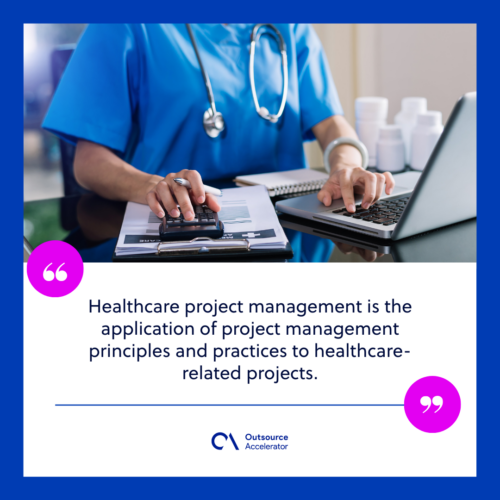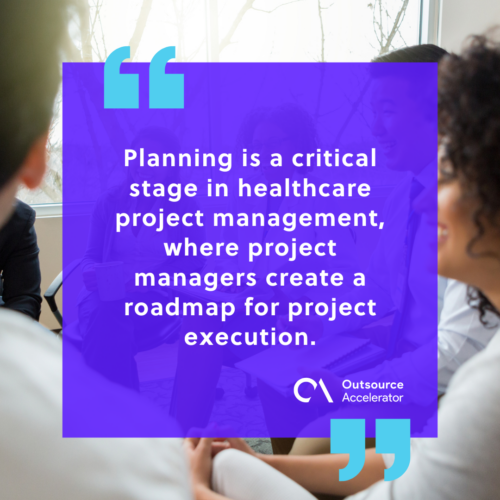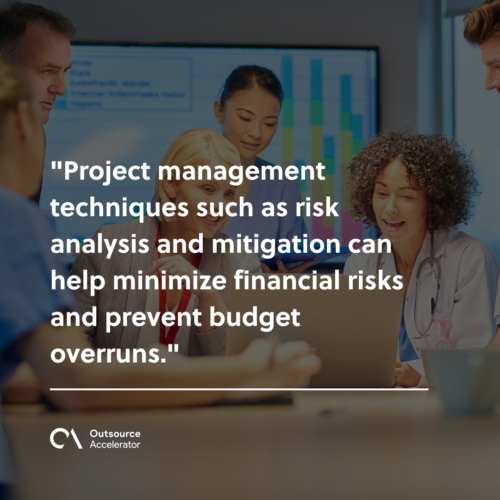Healthcare project management 101

The healthcare industry is rapidly evolving, with new advancements, innovations, and challenges emerging every day. In this complex environment, project management plays a crucial role in ensuring the successful delivery of healthcare initiatives.
Effective project management in healthcare requires unique skills and methodologies to navigate the challenges and intricacies of the industry.
This article will explore the fundamentals of healthcare project management, its methodologies, stages, benefits, and best practices.
What is healthcare project management?
Healthcare project management is the application of project management principles and practices to healthcare-related projects.
It aims to ensure that healthcare projects are executed efficiently, within budget, and meet the needs of stakeholders.
Healthcare project managers oversee projects relating to managing health systems. This includes implementing electronic health record systems, constructing medical facilities, developing new treatment protocols, or launching healthcare campaigns.

Methodologies for healthcare project management
Different methodologies can be employed in healthcare project management. This depends on the project’s complexity, scope, and requirements.
Let’s explore three commonly used methodologies:
Agile methodology
Agile project management emphasizes adaptability, collaboration, and iterative development. It breaks down projects into smaller, manageable tasks, allowing for flexibility and ongoing adjustments based on feedback.
Agile is particularly useful for software development projects in healthcare, where frequent changes and updates are common.
By embracing this methodology, healthcare organizations can quickly respond to evolving patient needs and emerging market trends.
Waterfall methodology
Waterfall project management follows a linear approach, with distinct phases that flow in sequence:
- Initiation
- Planning
- Execution
- Monitoring
- Closure
This methodology is suitable for projects with well-defined requirements and a clear understanding of the desired outcome.
Although it may not provide the same level of flexibility as Agile, Waterfall ensures a structured and systematic approach to healthcare project management.
Hybrid methodology
Hybrid project management combines elements from both Agile and Waterfall methodologies. It allows for flexibility and adaptability while maintaining a structured approach to project management.
This methodology is often used when project requirements and circumstances are likely to change throughout the project lifecycle.
By employing a hybrid approach, healthcare project managers can strike a balance between flexibility and structure.
Stages of healthcare project management
Let’s explore the key stages in healthcare project management:
Initiation
The initiation stage is where the healthcare project’s foundation is laid. It involves defining the project goals, objectives, and stakeholders’ expectations.
Project managers identify project risks and constraints and perform a feasibility study to determine whether the project is viable. This stage sets the direction for the entire project and ensures alignment with the organization’s strategic objectives.
During the initiation stage, project managers engage with key stakeholders, including healthcare professionals, administrators, and executives.
Planning
Planning is a critical stage in healthcare project management, where project managers create a roadmap for project execution.
It involves defining the project scope, developing a detailed project plan, assigning resources, estimating timelines, and setting project milestones.
During the planning stage, project managers gather requirements, analyze data, and develop a comprehensive project plan. They identify tasks and dependencies and allocate resources accordingly.

Execution and monitoring
The execution and monitoring stage is where the project plan is put into action.
Project managers oversee the implementation of the project, coordinate activities, and monitor progress. They ensure that resources are utilized effectively, deadlines are met, and quality standards are maintained.
Regular monitoring and reporting enable project managers to make timely adjustments, mitigate risks, and keep the project on track.
Conclusion
The conclusion stage marks the end of the project, but it is not the end of the project management journey. It involves wrapping up the project, evaluating its success, and documenting lessons learned for a smooth transition of deliverables.
Project managers conduct a thorough review to identify areas for improvement and celebrate the achievements of the project team.
Benefits of healthcare project management
Implementing proper project management practices in healthcare projects yields numerous benefits.
Organize processes
Healthcare project management brings structure and organization to complex processes.
A well-organized project ensures that everyone involved understands their responsibilities and can work together cohesively towards a common goal.
By establishing clear goals, defining roles and responsibilities, and developing comprehensive project plans, healthcare organizations can streamline workflows and improve overall efficiency.
Learn better project planning
Effective healthcare project management promotes better planning. It enables project managers to identify potential bottlenecks, allocate resources optimally, and anticipate challenges.
With improved planning, healthcare projects can be executed more smoothly, leading to better outcomes and reduced delays.
Additionally, better planning allows for effective resource utilization, helping organizations optimize their investments and reduce project costs.
Save costs
Healthcare projects often involve significant financial investments. Project managers can identify cost-controlling opportunities, avoid unnecessary expenses, and optimize the utilization of limited resources.
Project management techniques such as risk analysis and mitigation can help minimize financial risks and prevent budget overruns.

Maintain stakeholder relations
Stakeholder management is crucial in healthcare projects that involve multiple parties, such as healthcare providers, patients, regulatory bodies, and community stakeholders.
Effective project management ensures clear communication, alignment of expectations, and proactive stakeholder engagement. This leads to stronger relationships and improved project outcomes.
Healthcare project management best practices
The following best practices should be embraced to enhance the success of healthcare projects.
- Invest in a secure tool. Utilize a robust project management tool that offers security measures to safeguard sensitive healthcare data and facilitate collaboration among team members.
- Plan carefully. Devote ample time to project planning, ensuring that all project requirements and deliverables are clearly defined. A well-planned project establishes a strong foundation for successful project execution.
- Learn effective workload management. Prioritize tasks, allocate resources wisely, and continuously monitor project progress.
- Enable collaboration within teams. Foster a collaborative work environment, encourage open communication, and facilitate effective teamwork to leverage the diverse skills and knowledge of team members.
- Continuously monitor and evaluate. Regularly monitor project progress, track milestones, and reassess project risks and constraints. Conduct project reviews to identify potential areas for improvement and learn from past experiences.
Healthcare project management is a vital discipline that drives efficiency, saves costs, and improves outcomes in the healthcare industry.







 Independent
Independent




